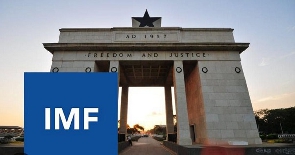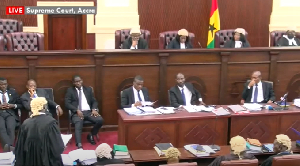Opinions of Tuesday, 6 June 2023
Columnist: Natogmah Issahaku
The US$ 3.0 billion IMF loan is no panacea for Ghana’s financial woes
Dear Excellency/Honourable,
This is an incredibly sad day for Ghana.
I do not understand why there are massive celebrations within circles of the ruling government following the acquisition of the US$ 3.0 Billion IMF loan. The proceeds from this loan are not an economic earning to Ghana; rather it is another stock of debt burden added to the younger generations of Ghana.
The current crop of politicians in government that is supposed to be role models, has turned a disgraceful economic failure and mediocrity into a glorious achievement, which sets a poor example for younger generations of Ghanaians.
So, it is difficult to fathom why the jubilation.
Advisedly, the euphoria surrounding the approval of the US$ 3.0 Billion IMF loan and the imminent disbursements, in tranches, should be measured and government should not go on a spending binge as if there will be no tomorrow for Ghana, especially given the terrible hardship and bad experience that the government put Ghanaians through in recent years.
The IMF loan is no panacea for Ghana’s financial woes, because the US$ 3.0 Billion that is aimed to stabilize the damaged economy with an estimated US$ 70 Billion national debt, literally speaking, is like a bucket of water that has been poured into an empty poly-tank.
The cynicism of Ghana going through this phenomenal financial crisis is real, if this IMF loan is not managed wisely, which is likely to be the case, particularly from the economic management ineptitude that government exhibited in recent years.
Critically, government needs to put a stop to the usual bad habits of profligacy, misuse, and misapplication of funds, which led Ghanaians to ongoing unprecedented suffering.
To not repeat the same financial mismanagement practices, proceeds from the IMF loan should not be used for personal benefits, self-aggrandizements, political parties, and general elections campaigns. Otherwise, Ghana will easily slide back into an even worse financial crisis by the end of 2026.
There is a dire need for Parliament to be stronger than it has hitherto been, to ensure that the US$ 3.0 Billion is used judiciously for the purposes it was sought for, thus balance of payments and budget support, stabilization of the Cedi’s performance in the foreign exchange market, etc.
Parliament should diligently ensure that government accounts for every single dollar that is spent from the IMF loan because it was all Ghanaians that suffered from the economic mismanagement and international ridicule that government put us through.
After all, Parliament approved all the loans and budgets, hence the onus of accountability and prudent spending rests on the august house.
The Legislature’s (Parliament’s) role is not only to approve loans but also, to enforce and monitor accountability for how proceeds from the loans are spent by the Executive arm of governance. The Opposition in Parliament needs to be much more formidable and effective than it has been, so far. A weak Parliamentary Opposition leads to weak governance and nonaccountability.
Parliament needs to frame new financial accountability laws that would mandate the Minister of Finance and the Governor of the Bank of Ghana to report and account to Parliament and Ghanaians, transparently and on national TV, every month, how Ghana’s money is being spent. They should account for total revenues and total expenditures for the previous month, and clearly, declare what was achieved in terms of projects, outputs, services, and outcomes.
Also, in the same meeting, they should report to Parliament and Ghanaians, how much government plans to spend in the coming month, how much revenue it expects to earn and what the expected achievements are in terms of projects, outputs, services, and outcomes.
This exercise would be able to check how government spends money and prevent it from, covertly and surprisingly, sliding Ghana back into another disgraceful financial bankruptcy, default, and economic crisis.
How can Ghana prevent another financial crisis from happening again?
By engaging in cost re-engineering, prudent spending; placed prioritizing; eliminating financial waste; reducing imports; encouraging import substitution by increasing production for local consumption; increasing value-added manufacturing and semi-processing of raw materials before export to build up substantial foreign currency reserves; building massive gold reserves; and by optimizing revenue mobilization and collection processes.
Monetary and Fiscal Policy Committees must be made more effective and should work together and meet regularly, monthly, to monitor and timely address any monetary and fiscal issues that may arise before they push Ghana into financial bankruptcy, default, and economic disaster again.
Above all else, Ghana needs to fight and win the war against endemic corruption, leadership incompetence, and poor policies, which descended the country into the economic mess we are living through now. According to the Ghana Integrity Initiative (2018 report) and other renowned world corruption index reports, Ghana loses more than US$ 3.0 Billion, annually, to corruption practices as bribes to Ghana government officials.
If Ghana could wean herself of corruption, she would not need a US$ 3.0 Billion IMF loan.
This is an incredibly sad day for Ghana, because this US$ 3.0 Billion IMF loan, which comes with conditionalities, is no panacea to Ghana’s deepening economic crisis.
Thank you, all.













